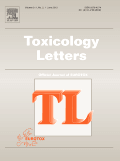
TOXICOLOGY LETTERS
Scope & Guideline
Unveiling the impacts of substances on health and environment.
Introduction
Aims and Scopes
- Molecular and Cellular Toxicology:
Research focusing on the mechanisms of toxicity at the molecular and cellular levels, including studies on cellular responses to xenobiotic exposure and the identification of molecular targets of toxicants. - Environmental Toxicology:
Investigations into the impact of environmental pollutants, including heavy metals and organic contaminants, on ecosystems and human health, emphasizing the need for risk assessment and regulatory measures. - In Vivo and In Vitro Models:
Development and application of various in vivo and in vitro models, including organ-on-a-chip technologies and animal models, to study the effects of chemicals and drugs on biological systems. - Regulatory Toxicology:
Research aimed at informing regulatory frameworks through the assessment of chemical safety, including the application of new approach methodologies (NAMs) and adverse outcome pathways (AOPs). - Pharmacokinetics and Toxicokinetics:
Studies that explore the absorption, distribution, metabolism, and excretion of substances, assessing how these processes influence toxicity and therapeutic outcomes. - Epidemiology and Biomonitoring:
Epidemiological studies and biomonitoring efforts that investigate the association between chemical exposure and health outcomes in human populations, contributing to public health knowledge.
Trending and Emerging
- Endocrine Disruption:
Research on endocrine-disrupting chemicals (EDCs) is increasingly prevalent, reflecting heightened awareness of their effects on human health and the environment, particularly regarding reproductive and developmental toxicity. - Nanotoxicology:
The study of the toxicological effects of nanomaterials is rapidly growing, as researchers seek to understand the unique properties and potential health risks associated with nanotechnology. - Immunotoxicology:
Emerging studies focused on the effects of chemicals on the immune system are gaining importance, particularly in the context of environmental exposures and their implications for immune-related diseases. - Microbiome and Toxicity:
Research exploring the interactions between environmental chemicals and the human microbiome is on the rise, emphasizing the role of gut health in mediating toxic effects. - Artificial Intelligence in Toxicology:
The integration of artificial intelligence and machine learning in toxicological assessments is becoming a significant trend, enabling more efficient data analysis and predictive modeling for safety evaluations. - Biomonitoring and Exposure Assessment:
The growing emphasis on biomonitoring studies that track human exposure to environmental chemicals reflects a trend towards understanding the real-world implications of chemical exposure on public health.
Declining or Waning
- Traditional Toxicology Testing Methods:
There has been a noticeable decline in publications focused on traditional animal testing methods as the field increasingly shifts towards alternative models such as in vitro systems and computational approaches for toxicity assessment. - Single-Chemical Exposure Studies:
Research concentrating solely on the toxic effects of single chemicals is becoming less frequent, as there is a growing recognition of the importance of studying chemical mixtures and their cumulative effects. - In Vivo Studies in Rodent Models:
The emphasis on rodent models for toxicological studies has diminished, with a greater focus now on human-relevant models and organ-on-a-chip technologies that better mimic human biology. - General Toxicological Reviews:
The journal has seen a decrease in general review articles that summarize broad topics in toxicology, as more specialized and focused reviews on specific compounds or mechanisms have become prevalent.
Similar Journals

Current Research in Toxicology
Exploring the Frontiers of Toxicology ScienceCurrent Research in Toxicology is a pioneering journal published by ELSEVIER that serves as a vital platform for disseminating cutting-edge research in the field of toxicology, spanning from biological impacts to pharmacological applications. With an ISSN of 2666-027X and an impressive Q2 ranking in key categories such as Applied Microbiology and Biotechnology, Health, Toxicology and Mutagenesis, and Toxicology, this journal underscores its commitment to high-quality research and significant contributions to the scientific community. Based in the Netherlands, Current Research in Toxicology aims to bridge the gap between academia and industry by providing rigorously peer-reviewed articles that cover a wide array of topics including novel methodologies, regulatory challenges, and emerging trends within the domain. The journal is accessible through various platforms, making it essential for researchers, professionals, and students eager to stay updated on the latest findings and advancements in toxicology. With a comprehensive focus on integrating theory with practical application, this journal is poised to influence future studies and policies in health and environmental science.
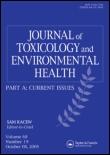
JOURNAL OF TOXICOLOGY AND ENVIRONMENTAL HEALTH-PART A-CURRENT ISSUES
Empowering Research for a Healthier EnvironmentJOURNAL OF TOXICOLOGY AND ENVIRONMENTAL HEALTH-PART A-CURRENT ISSUES, published by Taylor & Francis Inc, stands as a key resource in the interdisciplinary field of toxicology and environmental health. Operating under the ISSN 1528-7394 and E-ISSN 1087-2620, this journal maintains a strong presence with a Q2 category ranking in Health, Toxicology and Mutagenesis and a Q3 ranking in Toxicology as of 2023. It aims to disseminate critical findings that address contemporary issues in toxicology and environmental health, emphasizing the implications of environmental agents on human health. The journal offers both subscription and open access options, making cutting-edge research accessible to a diverse readership. With coverage of key topics from 1998 to 2024, it is an essential platform for academics, professionals, and students seeking to stay at the forefront of environmental health sciences.

CHEMICAL RESEARCH IN TOXICOLOGY
Illuminating the path to safer chemical practices.Chemical Research in Toxicology is a premier journal published by the American Chemical Society, dedicated to advancing the understanding of toxicological effects associated with chemical substances. Since its inception in 1988, this esteemed journal has maintained a robust impact factor, ranking in the Q1 quartile for both Medicine (miscellaneous) and Toxicology as of 2023, reflecting its significance and influence in the fields of pharmacology and toxicology. With an impressive Scopus ranking at #16 out of 133 in the Toxicology category, it serves as a vital resource for researchers, professionals, and students seeking cutting-edge insights and scholarly articles that bridge the gap between chemistry and toxicological science. Although not an open-access publication, it continues to provide comprehensive analyses and original research that inform safe chemical practices and regulatory policies, further enhancing its role in public health and safety.
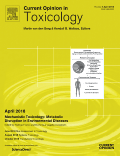
Current Opinion in Toxicology
Deciphering the Complexities of Chemical EffectsCurrent Opinion in Toxicology is a premier academic journal published by Elsevier, focusing on the latest advancements and perspectives in the field of toxicology. With an impressive impact factor reflecting its high citation and influence within the research community, this journal ranks in the Q1 category for Toxicology, positioned at #8 out of 133 in the Scopus Toxicology domain, placing it in the 94th percentile. The journal aims to provide concise and insightful reviews of contemporary research, fostering an understanding of critical issues related to toxic effects of chemicals and environmental agents. Although not an open access journal, it attracts a worldwide readership, making it an essential resource for researchers, professionals, and students committed to understanding toxicological science. Based in the Netherlands, Current Opinion in Toxicology serves as a platform for stimulating scholarly dialogue and guiding future research directions in this vital area of study.
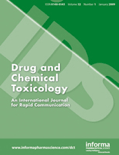
DRUG AND CHEMICAL TOXICOLOGY
Advancing safety through toxicological insights.Drug and Chemical Toxicology is a well-respected journal in the fields of toxicology, pharmacology, and public health, published by Taylor & Francis Ltd. Since its inception in 1978, this journal has diligently explored the effects and mechanisms of chemical exposures on health and the environment, fulfilling a crucial role in advancing scientific understanding and safeguarding public health. The journal is indexed across prestigious databases and features an impressive array of articles categorized within the Q2 and Q3 quartiles across various categories in 2023, reflecting its significance in Chemical Health and Safety as well as Environmental and Occupational Health disciplines. With an extensive reach and a focus on interdisciplinary research, Drug and Chemical Toxicology offers a rich repository of original research, reviews, and methodological advancements, catering to a diverse audience of researchers, professionals, and students dedicated to the betterment of safety and health standards. Although not an open-access publication, its articles are widely accessible to the academic community, ensuring that critical innovations and insights are shared for the greater good.
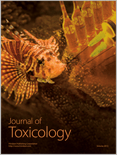
Journal of Toxicology
Advancing knowledge in toxicology and pharmacology.Journal of Toxicology, published by HINDAWI LTD, stands as a pivotal open-access journal in the fields of toxicology and pharmacology since its inception in 2009. With an ISSN of 1687-8191 and an E-ISSN of 1687-8205, this journal is dedicated to disseminating high-quality research that critically examines the effects of toxic substances on living organisms. Located in Egypt and operating from their London office, it aims to provide an extensive platform for researchers worldwide to share findings that can inform better practices in safety and regulation. As of 2023, it has achieved significant recognition, holding a Q3 ranking in both the pharmacology and toxicology categories, and is indexed in Scopus with noteworthy percentile rankings (Toxicology: 57th and Pharmacology: 55th). With a focus on innovative studies and emerging areas such as environmental toxicology, biomarker research, and therapeutic interventions, the Journal of Toxicology invites both experienced researchers and students to contribute, thereby enhancing the breadth and depth of toxicological knowledge for the global scientific community.

TOXICOLOGY AND APPLIED PHARMACOLOGY
Innovative Insights into Toxicology and PharmacologyTOXICOLOGY AND APPLIED PHARMACOLOGY, published by Academic Press, Inc. Elsevier Science, stands as a leading journal in the domains of toxicology and pharmacology, with its establishment dating back to 1959. With an impact factor reflecting its academic rigor and relevance, this journal is classified in the Q2 quartile for both pharmacology and toxicology categories, underscoring its significance in the scientific community. It ranks #34 out of 133 in Toxicology and #95 out of 313 in Pharmacology according to Scopus, placing it within the 74th and 69th percentiles, respectively. The journal aims to disseminate quality research that drives advancements in understanding the interactions of drugs and toxic substances within biological systems. Researchers and professionals are invited to contribute and engage with a broad spectrum of articles that cover mechanistic studies, risk assessment, and innovative therapeutic strategies. Although the journal does not offer open access, it continues to be a crucial resource for those who seek to navigate the complex interface of drugs and their toxicological implications.

JOURNAL OF APPLIED TOXICOLOGY
Innovating Toxicology Research for a Safer TomorrowJOURNAL OF APPLIED TOXICOLOGY, published by Wiley, stands as a leading platform in the field of toxicology, focusing on the rigorous examination of chemical substances and their effects on biological systems. With an impressive Impact Factor, it ranks in the top quartile (Q2) for toxicology journals, reflecting its esteemed position within the scientific community. The journal, identifiable by its ISSN 0260-437X and E-ISSN 1099-1263, has been an invaluable resource since its inception in 1981, and it continues to serve as a conduit for innovative research and practical applications through 2024. Positioned at the forefront of the field, it garners recognition in the Scopus Rankings, where it ranks #31 out of 133 journals in the toxicology category, placing it in the 77th percentile—a testament to its contribution to the advancement of pharmacology and toxicological sciences. While not an open-access journal, it remains accessible to a wide audience of researchers, professionals, and students eager to explore cutting-edge findings in applied toxicology, making it a pivotal resource for enhancing knowledge and fostering collaboration in the field.
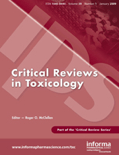
CRITICAL REVIEWS IN TOXICOLOGY
Exploring the Depths of Toxicology for a Safer FutureCRITICAL REVIEWS IN TOXICOLOGY, published by Taylor & Francis Ltd, stands as a preeminent journal within the field of toxicology, boasting an impressive Q1 ranking and holding the distinction of being ranked 12th out of 133 in the toxicology category according to Scopus, placing it in the top 91st percentile. With a continuous publication history since 1971 and a commitment to providing high-quality reviews, the journal offers critical insight into the latest research and advancements in toxicological sciences. While it is not an open-access journal, it provides numerous access options for both subscribers and institutions, ensuring that its extensive articles are widely available to the academic community. The journal's objectives are to disseminate comprehensive reviews that foster understanding and innovation in the assessment of chemical risks, environmental impacts, and the mechanisms of toxicity, making it an invaluable resource for researchers, professionals, and students dedicated to the science of toxicology.

Toxics
Transforming toxicology insights into public health solutions.Toxics is a leading international journal published by MDPI that has been dedicated to advancing the knowledge in the fields of toxicology, environmental health, and chemical safety since its inception in 2013. With an impressive Open Access model, it ensures that all research findings are readily available to a global audience, fostering collaboration and innovation across academia and industry. The journal is esteemed for its rigorous peer-review process and holds notable rankings, including Q1 status in Chemical Health and Safety and Q2 in both Health, Toxicology and Mutagenesis and Toxicology, reflecting its impact on critical research areas. Based in Basel, Switzerland, Toxics provides a platform for researchers, professionals, and students to disseminate significant findings on the implications of toxic substances in health and the environment, aiming to improve public health outcomes and inform regulatory decisions. With its ongoing commitment to high-quality research and relevant access options, Toxics continues to be an essential resource in the domain of toxicology and environmental sciences.